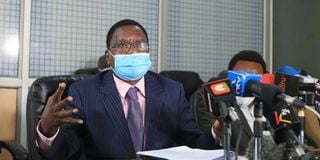Premium
2022: How politicians with fake academic papers will be exposed

KNQA chairman Kilemi Mwiria addresses journalists at Uchumi House in Nairobi on August 19, 2020.
Politicians with fake academic papers or certificates from learning institutions not recognised in the country will not secure clearance to vie in next year’s elections.
This follows a decision by the Kenya National Qualifications Authority (KNQA) to work with the electoral commission to vet academic papers presented by aspirants. It will seal a loophole used by politicians with questionable credentials to run for public office.
The development will also pile pressure on politicians who are already protesting over a new law that imposes a degree as the minimum academic qualifications for MP and ward representative aspirants in next year’s elections.
Yesterday, the KNQA announced it will collaborate with the Independent Electoral and Boundaries Commission (IEBC) to stamp out fake academic certificates presented by aspirants ahead of next year’s general election.
KNQA chairman Kilemi Mwiria said the authority is determined to restore order in the education sector by ensuring that all qualifications possessed by Kenyans are genuine.
As a pointer to the scale of the rot, KNQA Director General Juma Mukhwana revealed that a third of Kenyans have fake academic documents. Officials of the KNQA and IEBC met at Anniversary Towers to discuss strategies to ensure only aspirants with genuine documents will be cleared to contest.
“We are here to seek collaboration so that any candidate that will be seeking elective positions among others have their academic certificates vetted. We have the required expertise to handle the vetting of the academic documents,” said Dr Mwiria.
The law requires aspiring Members of Parliament and Members of County Assembly to have a minimum of a bachelor’s degree before they are cleared to contest.
While the Elections Act of 2011 had prescribed a degree for aspirants, politicians successfully petitioned the court to stop implementation of the requirement in the subsequent elections of 2013 but the cover lapsed with passage of the Election Laws (Amendment) Act 2017.
The amendment introduced the requirement for a degree “from a university recognised in Kenya” for MP and ward representative aspirants after 2017 elections but in January 2017, the National Assembly, again, pushed the implementation of the law to 2022.
This law could lock out thousands of aspirants, including a number of MCAs who are not university graduates.
Initially politicians were not required to have a certificate after their secondary education to contest for MP and MCA seats.
Only the President, deputy president, governors and deputy governors were required to be university graduates.
Dr Mwiria said that elected leaders need to lead by example by presenting genuine certificates to the electoral body.
IEBC Chairman Wafula Chebukati welcomed the support from the authority to expose academic fraud among aspirants.
“We will be happy to work together to address the issue of fake academic qualifications by candidates seeking elective positions,” said Mr Chebukati.
“We shall work together to ensure that only valid and genuine qualifications can be used in the electoral process in Kenya,” he added.
Mr Chebukati said close to 20,000 candidates are expected to contest various elective positions in the 2022 polls.
Dr Mukhwana said the authority is working together with learning institutions to ensure that learners are admitted in programmes that they qualify to study and are awarded proper qualifications.
Dr Mwiria said the authority has developed a national database for all qualifications.
It will contain information from all sectors on education and training systems.
The authority is mandated to maintain a national database of national qualifications and competences, provide for recognition of national and foreign qualifications, establish standards for harmonisation of qualifications and build confidence in the national qualification system.
The meeting was also attended by KNQA Deputy Director ICT, Mr Vincent Koech, IEBC Commissioner Prof Abdi Guliye, IEBC acting chief executive officer Marjan Hussein and acting deputy commission Secretary Mr Obadia Keitany.





